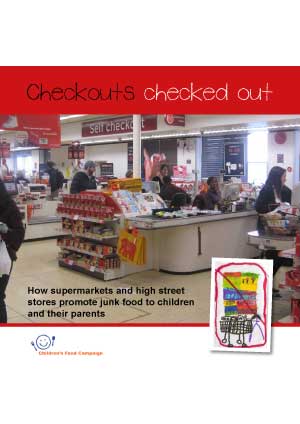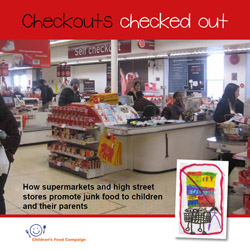
Checkouts checked out - how supermarkets promote junk food to children and their parents
| 1520Kb

Checkouts checked out - how supermarkets promote junk food to children and their parents
| 1520Kb
 Most children in the UK don’t eat a diet that is good for their health and meets dietary recommendations, and
Most children in the UK don’t eat a diet that is good for their health and meets dietary recommendations, and
childhood obesity is at an all-time high.
Food promotion in all its forms – on TV, websites, social media and via sponsorship of children’s heroes -
influences what children choose to eat.
To help tackle this problem, in 2003, the Food Commission launched a campaign, run by the Parents Jury, called “Chuck Snacks off the Checkout!”, calling for an end to the promotion of unhealthy food and drink products at supermarket checkouts. That campaign saw 3,500 checkouts in 300 stores surveyed and, in response, some companies reduced their promotions of junk food at their checkouts or added healthy options.
However, following complaints from parents that the tactic seemed to be increasingly used by other high street retailers, we were prompted to revisit this issue.
We carried out a survey in 48 branches of 14 national supermarkets and high street chains. We examined the number of checkouts where food and drink was on display in each branch and assessed whether the food being promoted was healthy or not. Our survey found that food was regularly displayed at the checkouts and in the queuing areas in these stores, and the vast majority of food promoted was unhealthy, with few healthy options on offer. In many cases, the food was positioned to attract the attention of children – and was often within their easy reach.
This junk food promotion is virtually inescapable for shoppers in these stores, and helps to ‘nudge’ people into less healthy behaviour. This undermines parents’ efforts to help their children eat a healthy diet and get the best start in life.
The history of campaigning on this issue suggests that retailers are unable or unwilling to stop voluntarily promoting junk food in their stores in this way. The Children’s Food Campaign is therefore calling for robust
Government action to help parents and bring an end to this type of marketing of junk food to children.
Find out more about the Chuck Junk Off the Checkouts campaign at: www.sustainweb.org/childrensfoodcampaign/our_campaigns/
Summary of findings:
Children's Food Campaign: Better food and food teaching for children in schools, and protection of children from junk food marketing are the aims of Sustain's high-profile Children's Food Campaign. We also want clear food labelling that can be understood by everyone, including children.
Sustain
The Green House
244-254 Cambridge Heath Road
London E2 9DA
020 3559 6777
sustain@sustainweb.org
Sustain advocates food and agriculture policies and practices that enhance the health and welfare of people and animals, improve the working and living environment, promote equity and enrich society and culture.
© Sustain 2024
Registered charity (no. 1018643)
Data privacy & cookies
Icons by Icons8